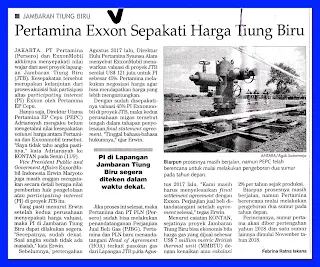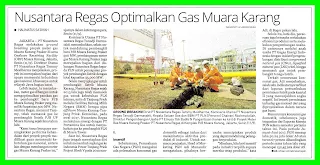PT Pertamina and ExxonMobil finally agreed on the fair value of the assets of the Tiung Biru Jambaran field project (JTB). The agreement is a continuation of the acquisition of Participation of Exxon participating interest (PI) by Pertamina EP Cepu.
Only, Pertamina EP Cepu (PEPC) President Director Adriansyah claimed not to know the value of the price acquisition agreement between Pertamina and Exxonmobil.
"I do not know the exact numbers," Adriansyah said
Vice President of Public and Government Affairs of ExxonMobil Indonesia Erwin Maryoto also still reluctant to say in detail how the value of the grant of management rights or participating interest (PI) in the JTB project.
What is certain according to Erwin after the two companies agree on the price of valuation, then PI in Jambaran Tiung Biru can be done immediately.
"Immediately, it is close, the question of numbers is no problem," said Erwin.
Earlier, in mid-August 2017, Upstream Director of Pertamina Syamsu Alam said EXXOnMobil offered valuation at JTB project worth US $ 121 million for PI of 45%. Pertamina negotiates the price in order to obtain a more favorable price.
With the approval of 45% PI Exxonmobil valuation in the JTB project, the two oil and gas companies are in the final phase of the completion of the statement agreement.
"There are still some legal languages," Erwin said.
If this process is completed, then Pertamina and PT PLN can already sign the Gas Sales and Purchase Agreement (PJBG). Pertamina and PLN have just signed a Head of Agreement (HOA) related to gas supply from JTB Field in August 2017.
"We still have to finalize the final settlement agreement with Exxon, and the sale and purchase agreement is signed after the agreement is completed," Erwin said.
According to the records, the true Jambaran-Tiung Biru project can be economical if the gas price is sold at US $ 7 million metric British thermal unit (MMBTU) with an increase or escalation of 2% per year since production.
Although the process is still running, but Pertamina plans to start drilling two wells next year. In details, the first well will be drilled mid-2018 and another well starting in November 2018.
IN INDONESIA
Pertamina Exxon Sepakati Harga Tiung Biru
PT Pertamina dan ExxonMobil akhirnya menyepakati nilai wajar dari aset proyek lapangan Jambaran Tiung Biru (JTB). Kesepakatan tersebut merupakan kelanjutan dari proses akuisisi hak partisipasi alias participating interest (PI) Exxon oleh Pertamina EP Cepu.
Hanya saja, Direktur Utama Pertamina EP Cepu (PEPC) Adriansyah mengaku belum mengetahui nilai kesepakatan akuisisi harga antara Pertamina dan Exxonmobil tersebut.
"Saya tidak tahu angka pastinya," kata Adriansyah
Vice President Public and Goverment Affairs ExxonMobil Indonesia Erwin Maryoto juga masih enggan mengatakan secara detail berapa nilai pemberian hak pengelolaan atau participating interest (PI) di proyek JTB itu.
Yang pasti menurut Erwin setelah kedua perusahaan menyepakati harga valuasi, maka PI di Jambaran Tiung Biru dapat dilakukan segera.
"Secepatnya, sudah dekat. Soal angka sudah tidak ada masalah," kata Erwin.
Sebelumnya, pertengahan Agustus 2017 lalu, Direktur Hulu Pertamina Syamsu Alam menyebut EXXonMobil menawarkan valuasi di proyek JTB senilai US$ 121 juta untuk PI sebesar 45%. Pertamina melakukan negosiasi harga agar bisa mendapatkan harga yang lebih menguntungkan.
Dengan sudah disepakatinya valuasi 45% PI Exxonmobil di proyek JTB, maka kedua perusahaan migas tersebut sedang dalam tahapan penyelesaian final statement agreement.
"Masih tersisa bahasa-bahasa hukumnya," ujar Erwin.
Jika proses ini selesai, maka Pertamina dan PT PLN sudah bisa melakukan penandatanganan Perjanjian Jual Beli Gas (PJBG). Pertamina dan PLN baru saja menandatangani Head of Agreement (HOA) terkait pasokan gas dari Lapangan JTB pada Agustus 2017 lalu.
"Kami masih harus menyelesaikan final settlement agreement dengan Exxon. Perjanjian jual beli ditandatangani setelah agreement selesai," tegas Erwin.
Menurut catatan, sejatinya proyek Jambaran-Tiung Biru bisa ekonomis bila harga gas yang di jual sebesar US$ 7 million metric British thermal unit (MMBTU) dengan kenaikan atau eskalasi 2% per tahun sejak produksi.
Biarpun prosesnya masih berjalan, namun Pertamina berencana mulai melakukan pengeboran dua sumur pada tahun depan. Perinciannya, sumur pertama akan dibor pertengahan tahun 2018 dan satu sumur lainnya dimulai November tahun 2018.
Kontan, Page-18, Tuesday, Sept 12, 2017.










